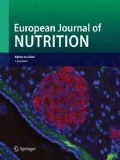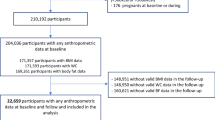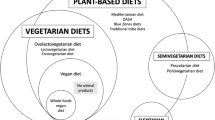Abstract
Purpose
Promoting sustainable diets through sustainable food choices is essential for achieving the sustainable development goals set by the United Nations. Establishing a practical tool that can measure and score sustainable and healthy eating is highly important.
Methods
We established a 30-item questionnaire to evaluate sustainable-dietary consumption. Based on the literature and a multidisciplinary advisory panel, the questionnaire was computed by principal component analysis, yielding the Sustainable-HEalthy-Diet (SHED) Index. A rigorous multi-stage process included validation in training-verification sets, across recycling efforts, as an indicator of environmental commitment; and validation across the proportion of animal-protein consumption, as an indicator of adherence to a sustainable and healthy dietary-pattern. The EAT-Lancet reference-diet and the Mediterranean-Diet-score were used to investigate the construct validity of the SHED Index score. Reliability was assessed with a test–retest sample.
Results
Three-hundred-forty-eight men and women, aged 20–45 years, completed both the SHED Index questionnaire and a validated Food-Frequency-Questionnaire. Increased dietary animal-protein intake was associated with a lower SHED Index total score (p < 0.001). Higher recycling efforts were associated with a higher total SHED Index score (p < 0.001). A linear correlation was found between the SHED Index score and food-groups of the Eat-Lancet-reference diet. A significant correlation was found between the Mediterranean-Diet-score and the SHED Index score (r = 0.575, p < 0.001). The SHED Index score revealed high reliability in test–retest, high validity in training and verification sets, and internal consistency.
Conclusion
We developed the SHED Index score, a simple, practical tool, for measuring healthy and sustainable individual-diets. The score reflects the nutritional, environmental and sociocultural aspects of sustainable diets; and provides a tangible tool to be used in intervention studies and in daily practice.



Similar content being viewed by others
Availability of data and material (data transparency)
The data will be available upon reasonable request.
Code availability (software application or custom code)
The syntax will be available upon reasonable request.
References
Mbow C, Rosenzweig C (2021) Chapter 5: food security—special report on climate change and land. IPCC website. Available via . Accessed 01/4 2021
Myers SS, Smith MR, Guth S et al (2017) Climate change and global food systems: potential impacts on food security and undernutrition. Annu Rev Public Health 38(1):259–277
Willett W, Rockstrom J, Loken B et al (2019) Food in the Anthropocene: the EAT-Lancet Commission on healthy diets from sustainable food systems. Lancet 393(10170):447–492
Burlingame B, Dernini S (2012) Sustainable diets and biodiversity: directions and solutions for policy, research and action. International Scientific Symposium, Biodiversity and Sustainable Diets United Against Hunger, FAO Headquarters, Rome, Italy, 3–5 November 2010. In: Anonymous Sustainable Diets and Biodiversity: Directions and Solutions for Policy, Research and Action. International Scientific Symposium, Biodiversity and Sustainable Diets United Against Hunger, FAO Headquarters, Rome, Italy, 3–5 November 2010. Food and Agriculture Organization of the United Nations (FAO)
COM E (2018) Communication from the Commission to the European Parliament, the European Council, the Council, the European Economic and Social Committee, the Committee of the Regions and the European Investment Bank, A Clean Planet for all. A European strategic long-term vision for a prosperous, modern, competitive and climate neutral economy. Brussels 28:2018
Bajželj B, Benton TG, Clark M et al (2015) Synergies between healthy and sustainable diets. UN Global Sustainable Development Report (GSDR) Brief. Available online: https://sustainabledevelopment.un.org/content/documents/635987-Bajzelj-Synergiesbetweenhealthyandsustainablediets.pdf. Accessed on 20 Sept 2018
Springmann M, Wiebe K, Mason-D’Croz D et al (2018) Health and nutritional aspects of sustainable diet strategies and their association with environmental impacts: a global modelling analysis with country-level detail. Lancet Planet Health 2(10):e451–e461
Germani A, Vitiello V, Giusti AM et al (2014) Environmental and economic sustainability of the Mediterranean diet. Int J Food Sci Nutr 65(8):1008–1012
Dernini S, Berry EM, Serra-Majem L et al (2017) Med diet 4.0: the Mediterranean diet with four sustainable benefits. Public Health Nutr 20(7):1322–1330. https://doi.org/10.1017/S1368980016003177
Lukas M, Rohn H, Lettenmeier M et al (2016) Assessing indicators and limits for a sustainable everyday nutrition. In: Proceedings in food system dynamics, pp 299–313
Béné C, Prager SD, Achicanoy HA et al (2019) Global map and indicators of food system sustainability. Sci Data 6(1):1–15
Jones AD, Hoey L, Blesh J et al (2016) A systematic review of the measurement of sustainable diets. Adv Nutr 7(4):641–664
Harray A, Boushey C, Pollard C et al (2015) A novel dietary assessment method to measure a healthy and sustainable diet using the mobile food record: protocol and methodology. Nutrients 7(7):5375–5395
Perignon M, Vieux F, Soler L et al (2017) Improving diet sustainability through evolution of food choices: review of epidemiological studies on the environmental impact of diets. Nutr Rev 75(1):2–17
Seconda L, Baudry J, Pointereau P et al (2019) Development and validation of an individual sustainable diet index in the NutriNet-Santé study cohort. Br J Nutr 121(10):1166–1177
Van Loo EJ, Hoefkens C, Verbeke W (2017) Healthy, sustainable and plant-based eating: perceived (mis)match and involvement-based consumer segments as targets for future policy. Food Policy 69:46–57
Pieniak Z, Żakowska-Biemans S, Kostyra E et al (2016) Sustainable healthy eating behaviour of young adults: towards a novel methodological approach. BMC Public Health 16(1):577
Meybeck A, Redfern S, Hachem F et al (2017) Development of voluntary guidelines for the sustainability of the Mediterranean diet in the Mediterranean region. In: Anonymous development of voluntary guidelines for the sustainability of the Mediterranean diet in the Mediterranean Region Valenzano (Italy), 14–15 Mar 2017. FAO
Seufert V, Ramankutty N, Foley JA (2012) Comparing the yields of organic and conventional agriculture. Nature 485(7397):229–232
Marsh K, Bugusu B (2007) Food packaging? roles, materials, and environmental issues. J Food Sci 72(3):R39-R55
Imamura F, O'Connor L, Ye Z, Mursu J, Hayashino Y, Bhupathiraju SN, Forouhi NG (2015) Consumption of sugar sweetened beverages, artificially sweetened beverages, and fruit juice and incidence of type 2 diabetes: systematic review, meta-analysis, and estimation of population attributable fraction. BMJ 351:h3576. https://doi.org/10.1136/bmj.h3576
Malik VS, Hu FB (2015) Fructose and cardiometabolic health. J Am Coll Cardiol 66(14):1615-1624
Johnson RK, Lichtenstein AH, Anderson CAM, Carson JA, Després J-P, Hu FB, Kris-Etherton PM, Otten JJ, Towfighi A, Wylie-Rosett J (2018) Low-calorie sweetened beverages and cardiometabolic health: a science advisory from the American heart association. Circulation 138(9)
Patel L, Alicandro G, Vecchia CL (2018) Low-calorie beverage consumption, diet quality and cardiometabolic risk factors in British adults. Nutrients 10(9):1261
Amienyo D, Gujba H, Stichnothe H, Azapagic A (2013) Life cycle environmental impacts of carbonated soft drinks. Int J Life Cycle Assess 18(1):77-92
Goldman D, Yavetz B, Pe’er S (2006) Environmental literacy in teacher training in Israel: environmental behavior of new students. J Environ Educ 38(1):3–22
Central Bureau of Statistics, Israel. The Social Survey, Israel, 2009–2010. Available via http://www1.cbs.gov.il/statistical/seker-chevrati-e124.pdf. Accessed 12 Dec 2012
Shahar D, Shai I, Vardi H et al (2003) Development of a semi-quantitative Food Frequency Questionnaire (FFQ) to assess dietary intake of multiethnic populations. Eur J Epidemiol 18(9):855–861
Shahar D, Fraser D, Shai I et al (2003) Development of a food frequency questionnaire (FFQ) for an elderly population based on a population survey. J Nutr 133(11):3625–3629
Trichopoulou A, Costacou T, Bamia C et al (2003) Adherence to a Mediterranean diet and survival in a Greek population. N Engl J Med 348(26):2599–2608
Dumas SE, Dongchung TY, Sanderson ML et al (2020) A comparison of the four healthy days measures (HRQOL-4) with a single measure of self-rated general health in a population-based health survey in New York City. Health Qual Life Outcomes 18(1):1–10
Donini LM, Dernini S, Lairon D et al (2016) A consensus proposal for nutritional indicators to assess the sustainability of a healthy diet: the Mediterranean diet as a case study. Front Nutr 3:37
Coats L, Aboul-Enein BH, Dodge E et al (2020) Perspectives of environmental health promotion and the mediterranean diet: a thematic narrative synthesis. J Hunger Environ Nutr 10(1080/19320248):1777242
Hirvonen K, Bai Y, Headey D et al (2020) Affordability of the EAT–Lancet reference diet: a global analysis. Lancet Glob Health 8(1):e59–e66
R Core Team (2019) R: a language and environment for statistical computing. R Foundation for Statistical Computing, Vienna, Austria. https://www.R-project.org/
Wickham H (2016) ggplot2: elegant graphics for data analysis. Springer, New York
CBS (2018) Religion and self-definition of extent of religiosity: selected data from the Society in Israel Report No. 10. Available via https://www.cbs.gov.il/en/mediarelease/Pages/2018/Religion-And-Self-Definition-Of-Extent-Of-Religiosity-Selected-Data-From-The-Society-In-Israel-Report-No-10.aspx
Sáez-Almendros S, Obrador B, Bach-Faig A et al (2013) Environmental footprints of Mediterranean versus Western dietary patterns: beyond the health benefits of the Mediterranean diet. Environ Health. https://doi.org/10.1186/1476-069X-12-118
UNESCO Mediterranean diet. Mediterranean diet. Inscribed in 2013 (8.COM) on the representative list of the intangible cultural heritage of humanity. Available via Accessed 25 Jan 2021
OECD (2021) Meat consumption (indicator) OECD data. Available via Accessed 20 Jan 2021
FAO FAOSTAT (2021) New food balances. FAOSTAT. Available via FAO. Accessed 25 Jan 2021
OECD (2017) Per capita meat consumption by country and region. OECD-FAO Agricultural Outlook 2017–2026. https://doi.org/10.1787/agr_outlook-2017-graph98-en
Cade J, Thompson R, Burley V et al (2002) Development, validation and utilisation of food-frequency questionnaires–a review. Public Health Nutr 5(4):567–587
Zagmutt FJ, Pouzou JG, Costard S (2020) The EAT-Lancet Commission’s dietary composition may not prevent noncommunicable disease mortality. J Nutr 150(5):985–988
Kerr DA, Dhaliwal SS, Pollard CM et al (2017) BMI is associated with the willingness to record diet with a mobile food record among adults participating in dietary interventions. Nutrients 9(3):244
Seconda L, Baudry J, Allès B et al (2017) Assessment of the sustainability of the Mediterranean diet combined with organic food consumption: an individual behaviour approach. Nutrients 9(1):61
van Dooren C, Marinussen M, Blonk H et al (2014) Exploring dietary guidelines based on ecological and nutritional values: A comparison of six dietary patterns. Food Policy 44:36–46
Scarborough P, Allender S, Clarke D et al (2012) Modelling the health impact of environmentally sustainable dietary scenarios in the UK. Eur J Clin Nutr 66(6):710
Scarborough P, Appleby PN, Mizdrak A et al (2014) Dietary greenhouse gas emissions of meat-eaters, fish-eaters, vegetarians and vegans in the UK. Clim Change 125(2):179–192
Masset G, Vieux F, Verger EO et al (2014) Reducing energy intake and energy density for a sustainable diet: a study based on self-selected diets in French adults. Am J Clin Nutr 99(6):1460–1469
Bjørnarå HB, Torstveit MK, Bere E (2019) Healthy and sustainable diet and physical activity: the rationale for and experiences from developing a combined summary score. Scand J Public Health 47(5):583–591
Ingwersen W, Cabezas H, Weisbrod AV et al (2014) Integrated metrics for improving the life cycle approach to assessing product system sustainability. Sustainability 6(3):1386–1413
Funding
The study was supported by MIGAL-Galilee Research Institute.
Author information
Authors and Affiliations
Contributions
ST and MG designed the research; ST conducted the research; DG analyzed the data; ST, DG and RG wrote the paper; DRS, AS, OM and DA participated in the expert panel and reviewed the manuscript. ST, DG and RG had primary responsibility for the final content. All the authors read and approved the final manuscript.
Corresponding author
Ethics declarations
Conflict of interest (include appropriate disclosures)
The authors have no competing interests related to this work.
Ethics approval
The study was approved by the ethics committee of Tel-Hai College.
Consent to participate (include appropriate statements)
All the participants in the study signed an informed consent form.
Consent for publication (include appropriate statements)
Not applicable.
Supplementary Information
Below is the link to the electronic supplementary material.
Rights and permissions
About this article
Cite this article
Tepper, S., Geva, D., Shahar, D.R. et al. The SHED Index: a tool for assessing a Sustainable HEalthy Diet. Eur J Nutr 60, 3897–3909 (2021). https://doi.org/10.1007/s00394-021-02554-8
Received:
Accepted:
Published:
Issue Date:
DOI: https://doi.org/10.1007/s00394-021-02554-8




